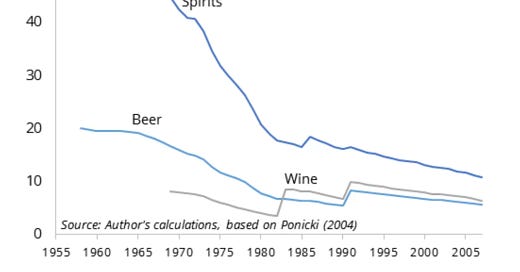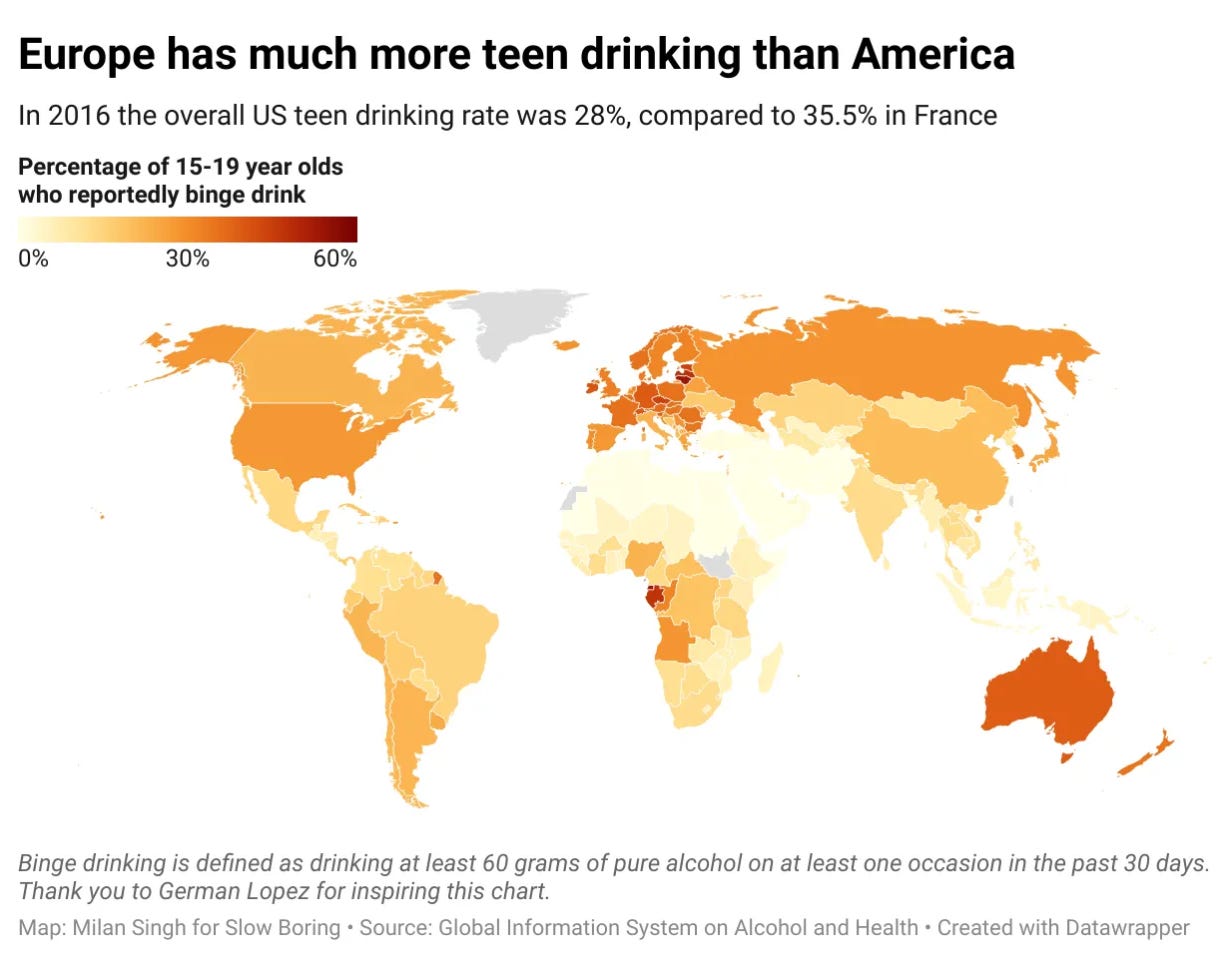We should pair marijuana legalization with tougher rules on booze
Increased marijuana use doesn't seem to be crowding out alcohol consumption
Twenty years ago, marijuana legalization was a much less mainstream position, and an argument those of us in the legalization camp often made was that marijuana is less dangerous than legal drugs like tobacco and alcohol.
That’s now much more widely accepted and, I think, pretty clearly true.
Limiting the comparative analysis to marijuana and alcohol, dependence risk for marijuana is lower, the risk of fatal overdose is much lower, and marijuana isn’t associated with increased levels of interpersonal violence the way alcohol is.
But the argument as stated is a pure hypocrisy argument, and pure hypocrisy arguments are a poor guide to public policy. I often point out to progressives that a lot of their arguments against the widespread availability of guns in the United States could also be wielded against the widespread availability of alcohol. My goal there is mostly to inspire people to show a little more cognitive empathy toward conservative gun owners. But while I do hope this framing helps inspire progressives to adopt somewhat calmer rhetoric, it’s still true that progressive skepticism of guns is empirically correct.
What’s more, the widespread availability of guns and widespread availability of alcohol interact in a way that compounds their individual deadliness: drunk people get into fights, and fights settled with guns are lethal. The comparison between the two should help people find a kind of intellectual and emotional equilibrium — but it doesn’t answer policy questions.
The interaction between marijuana and alcohol is a little bit different because it’s broadly plausible that people who use more cannabis will use less alcohol. A lot of boring middle-aged parents these days wind down before bedtime with a little cannabis instead of a glass of wine or a beer, and there’s nothing wrong with that.
Except we actually do need to know whether booming marijuana use is coming at the expense of other kinds of more dangerous drugs or if we’re piling health hazards on top of each other. The evidence base, unfortunately, is not crystal clear. But I think the balance of data suggests that marijuana consumption is growing in a way that is adding to the net public health burden. This isn’t to say we need to go back to throwing people in jail for smoking pot, but we should temper our enthusiasm for commercialization while encouraging more concern about the under-regulation of alcohol.
Alcohol is under-regulated in the United States
I won’t rehash the case for higher taxes on alcohol except to reiterate that, unlike most consumption taxes, alcohol taxes are probably progressive. That makes higher booze taxes a good anti-inflation measure over and above their other virtues.
And the value of federal alcohol taxes has eroded incredibly over time. You can see below the decline through the mid-aughts, and the situation has only gotten worse in the last 20 years. If your state hasn’t raised its local booze taxes over the past few years, then inflation alone since the start of the pandemic has massively eroded their real value.
Meanwhile, it seems that alcohol-related deaths spiked by 25 percent in 2020.
I don’t think anyone could, in good faith, argue that the spread of marijuana legalization is the reason alcohol abuse soared during the pandemic. You could maybe even make the case that it would have been even worse without legal pot.
But I do think that number is telling us that if marijuana has had any crowd-out effect on alcohol use, it’s been pretty minimal. This doesn’t mean the “marijuana is less dangerous than booze” analysis is wrong, it just means that leveraging the insight for policy requires an actual crackdown on alcohol.
Raising taxes is the first step in that process. But I think we really ought to consider restoring restrictions on advertising for alcohol.
For a long time, booze marketing was severely limited not by law but by industry self-regulation that was imposed to preempt formal government regulation. In the 21st century, that self-regulation has largely vanished, and booze marketing is pretty much everywhere. Re-imposing restrictions would be good practice on the merits, but also important precedent-setting for marijuana as it becomes legal in more of the U.S. At the moment, pot marketing is quite limited, but that’s a function of its largely gray market legal status. The current American norm is that to restrict advertising of something you have to make the product illegal. But it’s crazy to think we face a binary choice between throwing people in jail for smoking pot and ubiquitous marijuana ads.
We should tax booze, we should crack down on marketing, and we should try to lay the groundwork for a well-regulated marijuana regime.
We should restrict pot sales to teens
One aspect of American alcohol regulation that I think works better than people acknowledge is that even without a “war on teen beer drinking,” our age restrictions on alcohol sales actually do result in a lot less teen drinking than you see in Europe.
That’s something we should try to emulate with marijuana, and it’s a big part of the case for moving to a formal legalization framework.
Marijuana retailers and marijuana wholesalers should be able to establish valuable legitimate franchises that they don’t want to lose. If you’re caught wholesaling pot to unlicensed retailers, you should lose your license and that should cost you a lot of money. If you’re caught retailing pot to kids, you should lose your license and that should cost you a lot of money. This requires creating a legal marijuana sector that has valuable privileges like access to the banking system and the ability to engage in a limited amount of marketing. You should be able to earn a lot more money as a legitimate, licensed seller of cannabis products than as a black market seller, and that should create incentives to comply with the rules.
The flip side of this is that you still need to enforce the law against illegal sales. When I hear people complaining about police raids on “unlicensed stores” selling psychedelics, I’m reminded that there’s a sect of people in this country who truly don’t think anyone should be arrested for anything.


That mentality will destroy a sensible legalization regime. Buyers and sellers should be able to conduct transactions with each other in a way that is markedly superior to the illegal black market, and that means arrested black market participants. The goal should be to improve life in the United States of America, not just to back off enforcement of every rule simultaneously.
Getting high isn’t great for you
I do not believe that getting stoned constantly is a good idea. It does seem to be less dangerous than getting drunk frequently, but this is mostly a sign that we underrate the risks of alcohol.
Keep reading with a 7-day free trial
Subscribe to Slow Boring to keep reading this post and get 7 days of free access to the full post archives.





